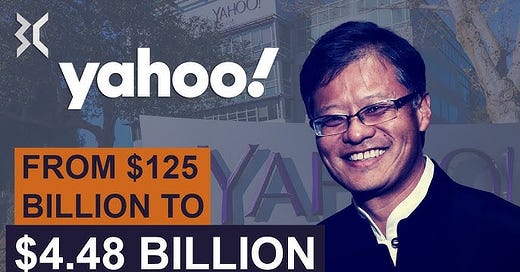Inspiring Tech Startup Story: Yahoo
Company: Yahoo!
Founders: Jerry Yang and David Filo
Year Founded: 1994
Current Market Cap: Once valued at over $100 billion, Yahoo was sold to Verizon for $4.48 billion in 2017.
Yahoo! was one of the pioneers of the early internet and the first to build an all-in-one web portal that introduced millions of users to the digital age. Founded in 1994 by Jerry Yang and David Filo, two PhD students at Stanford University, Yahoo’s growth story is one of explosive expansion, innovation, and, later, hard lessons from a rapidly changing tech landscape.
The Early Days: Building a Directory for the Web
Yahoo started out as a hobby project in 1994. Jerry Yang and David Filo were studying electrical engineering at Stanford when they decided to create a simple online directory to help people navigate the web. The web was still in its infancy at that time, and the lack of a structured way to search for websites inspired them to create "Jerry and David’s Guide to the World Wide Web." This guide soon evolved into Yahoo!, short for "Yet Another Hierarchically Organized Oracle."
Within just a year, Yahoo's user base grew so rapidly that the site was getting hundreds of thousands of hits per day. As the web expanded, more users relied on Yahoo to find their way around the internet. In response to the growing demand, Yang and Filo decided to turn Yahoo into a business.
Yahoo's Explosive Growth
In 1995, Yahoo received its first round of funding, a $2 million investment from Sequoia Capital, one of the most influential venture capital firms in Silicon Valley. By 1996, Yahoo went public with one of the most successful IPOs of the time. Its stock price nearly doubled on the first day, and Yahoo quickly became a darling of the internet boom.
Yahoo's success was built on its ability to be all things to all people. It was more than just a search engine—it was a web portal offering news, email, instant messaging, finance tools, sports coverage, and entertainment. By 1999, Yahoo was one of the most visited websites in the world, with over 230 million users.
At the height of the dot-com bubble, Yahoo's market capitalization soared to over $100 billion. It was the go-to web destination for millions of users and dominated the early internet landscape.
Innovations and Missed Opportunities
Despite its early success, Yahoo struggled to maintain its momentum as the tech industry evolved. One of Yahoo’s biggest strengths—its attempt to be an all-in-one portal—would later become a challenge as competitors began to specialize.
Yahoo ventured into early acquisitions, including Geocities, Broadcast.com, and Flickr. These moves signaled Yahoo's desire to expand its user base and dominate different areas of the internet. However, the company failed to capitalize on some key opportunities. In the early 2000s, Yahoo had the chance to acquire Google for $1 billion, but passed on the opportunity. It also missed the chance to acquire Facebook when Mark Zuckerberg was looking for potential buyers in 2006.
In addition, Yahoo was slow to adapt to the rise of search-based advertising, a model that Google perfected, allowing it to surpass Yahoo as the dominant player in search.
The Decline and Final Sale
By the mid-2000s, Yahoo began to struggle against competitors like Google, Facebook, and emerging tech giants. Its business model, which relied heavily on display advertising and its web portal, became outdated. As users migrated to specialized services and search engines, Yahoo’s once-dominant position eroded.
In 2008, Yahoo was approached by Microsoft, which offered to acquire the company for $44.6 billion, but Yahoo's board turned down the offer. This decision is often seen as a critical misstep, as Yahoo's value continued to decline in the following years.
After a string of CEOs and strategic misfires, Yahoo's downward spiral continued. In 2017, Yahoo was acquired by Verizon for $4.48 billion, a fraction of its peak value. The Yahoo brand was integrated into Verizon's Oath division, marking the end of an era for one of the internet's earliest giants.
Yahoo’s Legacy
Despite its decline, Yahoo played a pivotal role in shaping the early internet. It was one of the first major tech companies to go public, inspiring a wave of startups to follow. Yahoo also created a vast ecosystem of web services, many of which have lived on through other companies and innovations.
Yahoo Mail still has millions of active users, and many of its early innovations laid the groundwork for how we interact with the web today. Yahoo's story is a lesson in both the importance of innovation and the dangers of resting on early success.
Though Yahoo no longer holds the dominance it once did, its legacy as a pioneer in the internet space remains undeniable.
Before you go please check our WhatsApp channel and subscribe here




